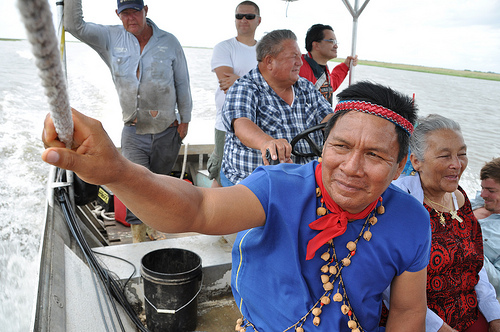 On Tuesday morning Mariana Jiminez a 71-year-old grandmother from the region in Ecuador devastated by Chevron’s massive oil contamination, dipped her hand in the oil black water covering the precious marshlands just off Louisiana’s Gulf coast and held a dying, oil-drenched crab in her hand.
On Tuesday morning Mariana Jiminez a 71-year-old grandmother from the region in Ecuador devastated by Chevron’s massive oil contamination, dipped her hand in the oil black water covering the precious marshlands just off Louisiana’s Gulf coast and held a dying, oil-drenched crab in her hand.
This week, four Indigenous and community leaders from Ecuador, as well as advocates from Rainforest Action Network and Amazon Watch are deep in Louisiana’s sweltering Bayou to witness the depth of BP’s oil disaster and share lessons and cautionary tales with Indigenous communities in the Gulf.
The Ecuadoreans have traveled by boat and across traditional lands to meet the local United Houma Nation and Atakapa-Ishak tribes, communities dependent on a healthy Bayou for their survival and terrified of the toll this most recent oil disaster will have on their livelihoods, their families, and their very way of life.
In every conversation with every person we meet on this powerful, infuriating, and deeply sad journey it is remarkable how similar the stories are.
On Tuesday afternoon, Rosina Phillipe invited us unto her dock in the tiny Grand Bayou Village community, home to 9 Atakapa-Ishak families and accessible only by boat. Rosina explained that for thousands of years her community has depended on the bountiful Bayou for their food, water, and cultural practices. They have weathered terrible storms, government and oil industry theft of their land, but are afraid they may not survive this oil disaster. If her community can no longer eat or work, how will they continue to live on the water as they have done for generations?
While sharing a delicious lunch with leaders and elders of the United Houma Nation at an old Native school house turned tribal center, Emergildo, Humberto, Luis, and Mariana shared their experiences of Chevron’s oil contamination and the impact it has had on their environment, health, and traditional practices. They too used to fish, but have had to start farming to sustain themselves. They spoke of the family members they have lost from oil-related birth defects, illnesses, and cancers and warned the Houma of the long-term health problems they will face, long after the TV cameras and the company has left.
As we walked along the deserted, oil stained beach in Grand Isle, Brenda Dardar Robichaux, former Principal Chief of the United Houma Nation, explained how she has been struck by how similar her story is to the Indigenous people of Ecuador.
From Louisiana’s Bayou to Ecuador’s rainforest, you see the same oil-drenched waterways, dying animals, and smell the same toxic stench in the air. Families nurse their loved ones through similar oil-related illnesses, respiratory diseases, and cancers- while being told the same lies by the oil companies and politicians that the oil won’t hurt them. And Indigenous communities the world over are forced to adapt and fight like hell for their physical and cultural survival.